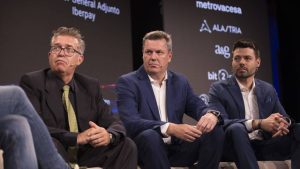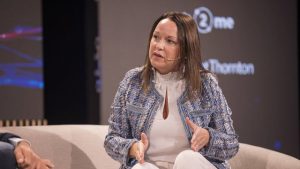Experts of the sector returned to meet in a forum that has been consolidated as a reference in the world of the Blockchain. Flying over every analysis, a question: We are before an opportunity or a brake for the innovation?
The Regulations on Markets of Digital Assets —MiCA by its initials in English: Markets in Crypto Assets— will enter vigor on 30 December. It will do for the new servicessuppliers, whereas those signatures that they are already operating will have a period of adjustment to new circumstances of the EU and that it will conclude one year later. “The objective is order the sector and protect to the investors, although these must know that will be more exposed than with another type of regulated”products. With this affirmation, Montserrat Martínez, deputy chairwoman of the CNMV, inaugurated the VII edition of the digital Active forum: virtual innovation, actual impact. And, precisely, doing honour to the title of the meeting, made good use of its discourse to request to the sector that “does not leave escape the opportunities that offers MiCA to go beyond the speculation and thus offer helpful services for the company”.
The meeting was organised by The Confidential one, together with Cecabank, Telefónica, Metrovacesa, Alastria, A&G, Bit2me and Grant Thornton and, as it happened in previous years , had the share of more than 30 experts in the matter. The one responsible for extract value to each one of its shares went Javier Molina, journalist specialised in investment and technology Blockchain, and author of the podcast Ideas with value.
The European regulation flew over everything the meeting, especially in the panel in which participated Alfredo Muñoz, teacher of Commercial Law of the UCM and Of Counsel of Grant Thornton; Cristina Carrascosa, lawyer and CEO of ATH21; and Joaquim Matinero, lawyer banking-financial and Blockchain Counsel of Ceca Magán.
Joaquín Matinero began specifying how “certain areas of Asia are leaders in payments with money tokenizado, while Europe goes straggler in this context ”. Despite the delay, warned that “Germany and France are already implementing companies of record for these assets, which assistance and provides the purchase of tokens”.
[GALLERY | Click here to see the full gallery of the event]
Furthermore, Alfredo Muñoz showed its concern for this question: “The fact that Spain does not have one of these organisations, would be able to cause an outsourcing of jobs of the projects related to digital assets towards other countries of the EU”, the expert alerted.
Cristina Carrascosa coincided with its panel partners and it confirmed “the existence of these technical hitches and regulatory around the money tokenizado, especially in the EU”. Similarly, underlined “the need of going down the standard to earth to allow the real implementation of the technology in financial markets and industrial goods ”.
«Spain does not have a company of assets record digital. This causes outsourcing of jobs of the projects», A. Muñoz (Grand Thorton)
In parallel to the development of the regulation, Europe works in its own technology-based currency Blockchain and very focused to the means of payment. Mayte Arráez, boss of division in the Address of the digital euro in the European Central Bank, shared its first hand experience in the development of the project: “This currency will give a fee-paying unified experience and homogenous, and will provide transactions in all the EU. There will be two fee-paying models, one offline for private transactions, and another online that it will allow the payment with details separated from the user”.
In a similar line, José Manuel Marqués, director of the department of Financial and Market infrastructures Innovation of the Banco de España, explained that “although in the wholesale field already everything is electronic, the digital euro will serve as an alternative that it solves the fragmentation in payments”. In addition, “will guarantee a fee-paying regulated experience and homogenous Europe-wide ”, coincided.
Continuing with the analysis of the fee-paying means, for Juan José Gutiérrez, corporate director of Technological Services of Cecabank, the key is in “the interoperability and the skills of exchange that allows this technology”. To embrace her, “the banking plays a central function in its adoption and the success of the digitalpayments, although still there are no clear winners on the market ”, said. Between the new players that they have done appearance in last times Correos is found. On this interest in the Blockchain of the operator postcard, Alberto López, Assistant Managing Director of Iberpay, remarked that “looks for niches where has not been stressed up to now, as that one of the people at risk of financial exclusion of rural areas or areas where the banking has been neglected”, ensured.

José Manuel Marqués, Financial Innovation director and Market infrastructures of the Banco de España; Juan José Gutiérrez, Corporate Director of Technology Services at Cecabank; and Alberto López, Assistant Managing Director of Iberpay.
But beyond the digital payment, during the meeting, went numerous cases of exposed use before the assembled spectators and the audience that it followed it via social networks. One of them arrived thanks to Miguel Ángel Domínguez, chairman of Alastria: “Our organisation will sign prompt an agreement with the Community of Madrid for a project of Blockchain that will be aimed at benefit with this technology to the SMEs”. How? «Generally speaking, is unite paths of the large businesses with anyone who submitted to public projects are never had. With it will achieve maximise the impact of the funds NextGen”, specified.
Another of the useful tools in which is worked in the world of the digital assets is the identity. For Raúl López, member of Digital Assets & web3 in Grant Thornton, “this not only will be applied to citizens, but also in the corporateworld, providing the certification of suppliers and other processes”. All of this will give as a consequence “new use cases, as, for example, the possibility of issuing distinctive of renewable energy ”, pointed out. Its social gathering partner, Ignacio Alamillo, Advisor of Logalty Group, indicated that “the digital identity moves forward in the EU, with the licence of European driving as first step”. And with respect to the possibility of using pseudonyms, explained that “they will be a characteristic key for provide from privacy to the citizens».
«The digital identity moves forward in the EU. Its first step will be the licence of European»driving, Ignacio Alamillo, Advisor of Logalty Group
Suppliers of services are the more interested in than the chain of blocks has usefulness on the day to day of the users. Thus, Jorge Ordovás Oromendía, Product Manager in the area of Web3 and Metaverso of Telefónica Innovation Digital, emphasised that “the challenge of the Web3 is provide its use to the generalpublic, not only to the native users of these technologies”. To achieve it, “are looked for innovations disruptivas, as the decentralisedconnectivity , to do more accessible the profits to any person”.
And between the applications that they are proliferating in the financial environment, Javier Tordable, co-founder & CEO of Bit2me Security Token Exchange, brought to collation the share markets: “From Bit2me are developing a stock exchange 3.0, based on Blockchain and concentrating on investment funds, with the aim of creating a liquid”primary market. The expert mentioned “the importance that will have the regulation when generate efficiencies in the process”.
Properties tokenizados?
The actual one estate also is in the focus of the digital assets. But in what point is found? Jimena Campuzano, registrar of the property, ensured that “the tokenización property is viable in Spain. The standard does not forbid it, but the difficulty is in reconciling the physical thing and the digital thing”. From its point of view, “the record is ready technologically, although lack someone that it executes it. That is why it is essential to involve to independentcompanies or professionals, such as architects or computer engineers, to guarantee the process”, indicated. However, Enrique Aznar, lawyer and CEO of RealFund, disagreed when it stated that “the tokenización property in Spain is difficult because you can not register the own one token in the record”.
One of the companies that is embracing this technology in the property environment is Metrovacesa. Carmen Chicharro, director of Agent, Marketing and Innovation of the signature, specified how allows “drawing everything the development process, especially giving security and transparency”. “In addition —continuó—, are exploring how the IA can optimise processes as the architectural design or the customer service ”. Its partner Silvia Díaz, Marketing and Communication person responsible for of Metrovacesa, specified that “the Artificial Intelligence we allow optimising campaigns of marketing, allowing a massive real-time customisation, improving the efficiency of teams”.
It fights it between a technology that it promised decentralisation in a world without banks and the traditional companies back already is. Today, the financial signatures not only they do not ignore the Blockchain, but instead that they take advantage of its goodnesses to offer a better service: “One of the points that they must still be surveiled is that one of the custody of cryptographic assets because requires of a technological”evolution, Aurora Cuadrospermitted , corporate director of Securities Services of Cecabank. “In our company are ready to offer services of custody from the currentregulatory framework, since we work mostly with institutional”companies, the expert explained.

Aurora Cuadros, Corporate Director of Securities Services at Cecabank.
Another traditional bank present in the forum went BBVA. Its CEO in Switzerland, Alfonso Gómez, defended that “the financial institutions must play a central role in the consolidation of the system of digital”assets. How? “Using stablecoins, as the USDC, since they are a crucial bridge between traditional and digital assets that reduce the volatility”. With respect to the operation of Bitcoin, analysed that “we observe that it is evolving towards a booking of value”.
“The Bitcoin is a more accessible shelter asset and less costly to guard that the gold, but will not substitute to the dóllar», J. R. Grate (economist)
With this assessment coincided partially Juan Ramón Rallo, teacher of Economy of the University Francisco Marroquín, who specified that “the Bitcoin is a more accessible shelter asset and less costly to guard that the gold”. In fact, “long-term, can be a booking of value significant, although it does not seem that it is going to replace the dollar as a reserve currency ”, underlined. Nonetheless, Román González, co-manager of the fund Criptomonedas F.I.L. of A&G, disagreed and it pointed out that “the criptomonedas as Bitcoin yes are views as a long-term investment, with potential to be a shelter of value higher than the gold”.
Beyond the debate on the potential as value shelter of this kind of currencies that they occupy the top for capitalisation of market, the truth is that the markets have big part of its gaze concentrating on the digital assets. “So much is so the technology Blockchain is improving the efficiency in the industry of investment funds, providing fast internal transfers and improving the liquidity”, just as it emphasised Rubén Nieto, MD of Allfunds Blockchain. The speaker mentioned that “the tokenización of traditional assets is the future” and that “the managers already support fully the technology”.

Javier Molina, collaborating with The Confidential one and moderator of the event.
For Luis Pastor, CEO and co-founder of Tritemius, “the venture capital is a regulated instrument that provides the exhibition to the sector a via investments in startups», whereas Jaime Silio, product and development person responsible for of business of the area of post-contracting of BME SIX, stressed that “there is a clear one need of a stable regulatory framework to move forward”.
Under the prism of Jorge Serna, Chief Product and Technology of Securitize, does not be tokenizarlo everything to obtain liquidity: “In the end a bad product is not good because of be tokenizado. The major value, in addition to the effectiveness of the technology, resides in turning the assets in programmable”, emphasised.
Furthermore, Tali Salomon, district manager of eToro in Spain, Portugal and Latin America, explained that “Spain is seeing a rise in the adoption of digital assets, with 40% of investors showing interest” and it ratified that “the regulation will give more security and will attract to more investing, providing the transition between the traditional world and the digital one”.
«The regulation will give security and will attract investors, providing the transition between the traditional thing and the digital thing», T. Salomon (eToro)
Continuing with the analysis of the markets, Victor Jung, Head of Digital Assets & MD of Hamilton Lane, argued that “the private market has exceeded in yield to the public, but the retail investors still do not have access to him. The tokenización can reduce barriers of entrance, allowing the retail investors access the private”market.
And, as it fitted expect, the DAO —en English: Freelance organisations Descentralizadas— also had its space in the debate. It went in the turn of María of the Sagrario Navarro, senior lecturer of Commercial Law of the UCLM and Academic Advisory Body stocking of INATBA, who stated that “they are advancing, especially in projects of social impact , as those of United Nations with Cardano, because they have the potential of making profitable the reputation and tokenizar contributions beyond the money”.
On the same topic, Susana Rodríguez, teacher of Blockchain of IE University, explained that “although the concept of Web3 still is not fully decentralised, is crucial how are created communities and encourages them to him through tokens”. Of course, “the escalabilidad and adaptabilidad to the regulation will be essential for its success”, warned.
The integration with other emerging technologies
The participants in the meeting coincided when point out how the Blockchain has begun to integrate with other technologies, promoting its functionalities. “So that this happens, results fundamental the collaboration public-private and the creation of ecosystems of innovation that attract investments”, Juan Angel Morejudo defended Flores, viceadviser of Digital Transformation of Castile-La Mancha. And it put an example: “Thanks to the funds NextGen have achieved promote digitisation and sustainability projects in our region and form to more than 32,000 people”, specified.
Between the convergent technologies is found the IA. For Daniel Diez García, boss of Innovation of Accenture, “the Artificial Intelligence is currently limited by the lack of context, which impedes that it is completely effective in some areas”, although it stated that “the experiences conversacionales with IA, more than the apps traditional, will be the focus in the capture of clients in the future ”.
Continuing with the IA, Elen Irazabal, teacher of the Carlos III and of IE University, analysed the new model of Open AI —llamado o1 officially and Strawberry in its phase of desarrollo—: “Is focused on the reflection and the reasoning, not only towards the speed. Which is a very relevant”change, explained. Finally, Marcos Carrera, Head of Blockchain & Web3 Iberia of Fujitsu Spain, bet in its intervention for “evidence of zero knowledge (known as ZK), since they are the future to guarantee privacy in the verification of details. It is there where converge the privacy and the verificabilidad, together with the IA, and all of this can transform the data management ”, concluded.


